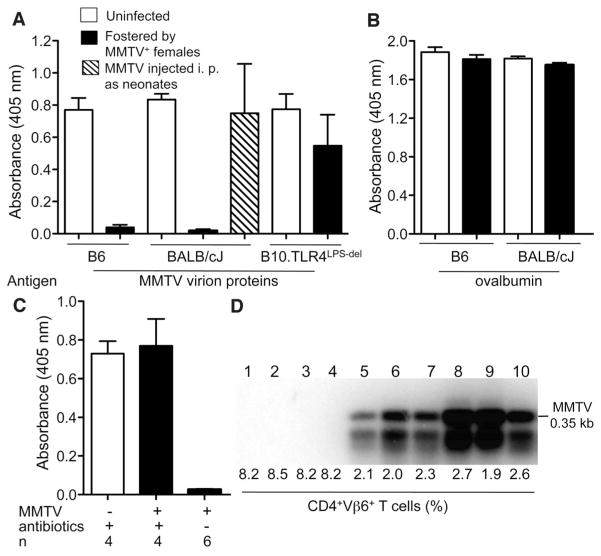Fig. 1.
Unresponsiveness to MMTV is dependent on the oral route of infection and on microbiota. (A and B) Mice of indicated strains—MMTV-free or infected by fostering on MMTV-infected lactating MMTV(LA) females or infected intraperitoneally (i.p.) at 3 to 5 days of age—were immunized at 8 weeks of age with either MMTV(LA) proteins (A) or ovalbumin (B) in Freund’s complete adjuvant. Production of specific Abs to respective antigens was tested by enzyme-linked immunosorbent assay (ELISA). Sera from four to eight mice were used per group. One of three experiments is shown. (C) The progeny from the first pregnancy of uninfected and MMTV(LA)-infected B6 females, treated with a mixture of broad-spectrum antibiotics or left untreated, were immunized at 6 weeks of age with MMTV(LA) proteins and tested for virus-specific Abs by ELISA (detailed experimental scheme is shown in fig. S1A). n, number of mice. All graphs, means ± SEM. (D) MMTV infection of mice used in (C) was probed by polymerase chain reaction (PCR) amplification (under saturating conditions) of integrated proviruses in splenic DNA followed by Southern blot with an MMTV long terminal repeat (LTR)–specific probe (lanes 1 to 4, offspring of infected antibiotic-treated females; lanes 5 to 10, offspring of infected, untreated females) and by evaluating deletion of SAg-cognate CD4+ Vμ6+ T cells. Uninfected B6 mice (n = 5) had 8.5 ± 0.3% of CD4+Vμ6+ T cells among CD4+ T cells.

